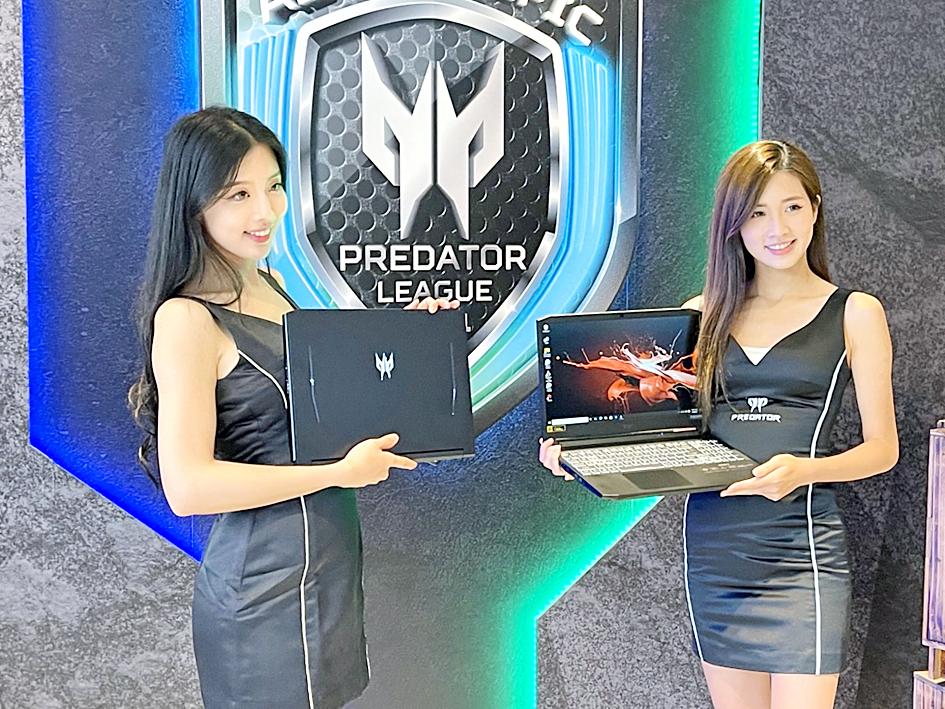Acer Inc (宏碁) yesterday reported a net profit of NT$2.74 billion (US$98 million) for last quarter, marking the PC brand’s highest quarterly earnings in a decade.
That represented growth of 391 percent from NT$558 million a year earlier.
On a quarterly basis, net profit jumped about 37 percent from NT$1.99 billion in the fourth quarter of last year.

Photo: CNA
Earnings per share surged to NT$0.91 last quarter from NT$0.18 a year earlier and NT$0.67 the previous quarter.
Consolidated revenue reached NT$71.56 billion in the first quarter, up 46.5 percent year-on-year.
Gross profit was NT$8.31 billion, up 67.9 percent year-on-year.
Operating income was NT$2.81 billion, “with a historically high first-quarter margin of 3.9 percent,” a news release by Acer said.
Continued strong demand for notebook PCs contributed to Acer’s robust first-quarter figures.
The distance-learning market in the US, Europe, Japan and Southeast Asia is going strong, while the company’s first-quarter Chromebook sales grew 141 percent year-on-year, a report by the Chinese language Commercial Times said.
Acer’s investment in e-sports has also paid off, with its e-sports laptops, desktops and monitors growing 87 percent year-on-year, the report said.
Acer also announced yesterday on the Taiwan Stock Exchange that it would be selling 4.6 million shares of its subsidiary Highpoint Service Network Corp (海柏特).
According to the Chinese-
language Web site cnyes.com, Highpoint is planning an initial public offering (IPO) in the fourth quarter of this year.
It aims to list on the emerging market index in the second quarter of next year and move to the Taiwan Stock Exchange in the second quarter of 2023, if everything goes well, cnyes.com said.

South Korea’s equity benchmark yesterday crossed a new milestone just a month after surpassing the once-unthinkable 5,000 mark as surging global memory demand powers the country’s biggest chipmakers. The KOSPI advanced as much as 2.6 percent to a record 6,123, with Samsung Electronics Co and SK Hynix Inc each gaining more than 2 percent. With the benchmark now up 45 percent this year, South Korea’s stock market capitalization has also moved past France’s, following last month’s overtaking of Germany’s. Long overlooked by foreign funds, despite being undervalued, South Korean stocks have now emerged as clear winners in the global market. The so-called “artificial intelligence

NEW IDENTITY: Known for its software, India has expanded into hardware, with its semiconductor industry growing from US$38bn in 2023 to US$45bn to US$50bn India on Saturday inaugurated its first semiconductor assembly and test facility, a milestone in the government’s push to reduce dependence on foreign chipmakers and stake a claim in a sector dominated by China. Indian Prime Minister Narendra Modi opened US firm Micron Technology Inc’s semiconductor assembly, test and packaging unit in his home state of Gujarat, hailing the “dawn of a new era” for India’s technology ambitions. “When young Indians look back in the future, they will see this decade as the turning point in our tech future,” Modi told the event, which was broadcast on his YouTube channel. The plant would convert

‘SEISMIC SHIFT’: The researcher forecast there would be about 1.1 billion mobile shipments this year, down from 1.26 billion the prior year and erasing years of gains The global smartphone market is expected to contract 12.9 percent this year due to the unprecedented memorychip shortage, marking “a crisis like no other,” researcher International Data Corp (IDC) said. The new forecast, a dramatic revision down from earlier estimates, gives the latest accounting of the ongoing memory crunch that is affecting every corner of the electronics industry. The demand for advanced memory to power artificial intelligence (AI) tasks has drained global supply until well into next year and jeopardizes the business model of many smartphone makers. IDC forecast about 1.1 billion mobile shipments this year, down from 1.26 billion the prior

People stand in a Pokemon store in Tokyo on Thursday. One of the world highest-grossing franchises is celebrated its 30th anniversary yesterday.